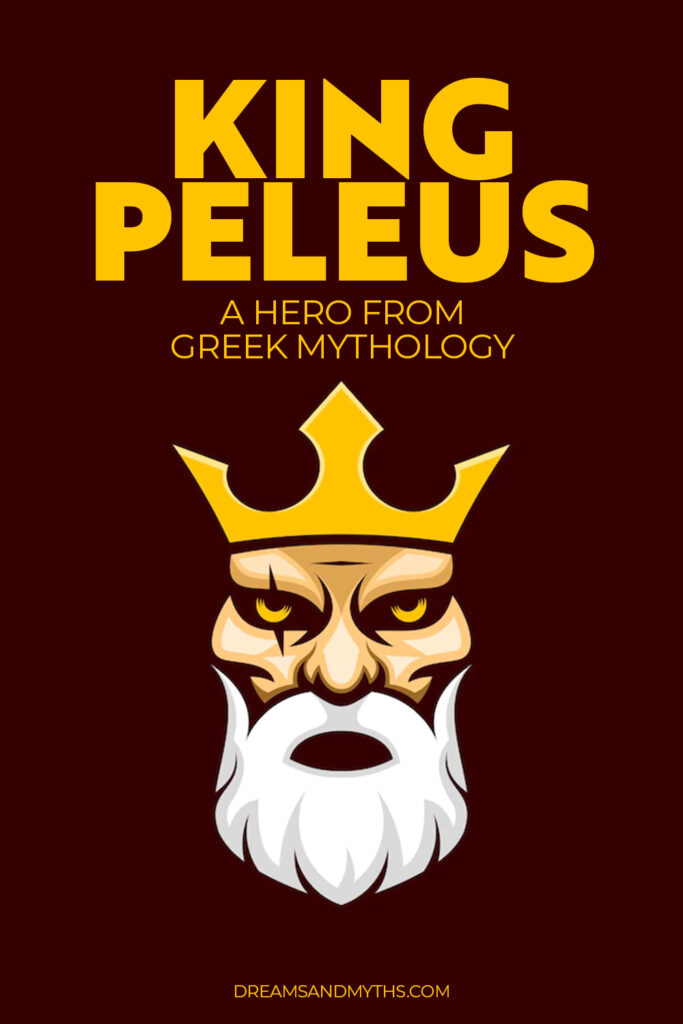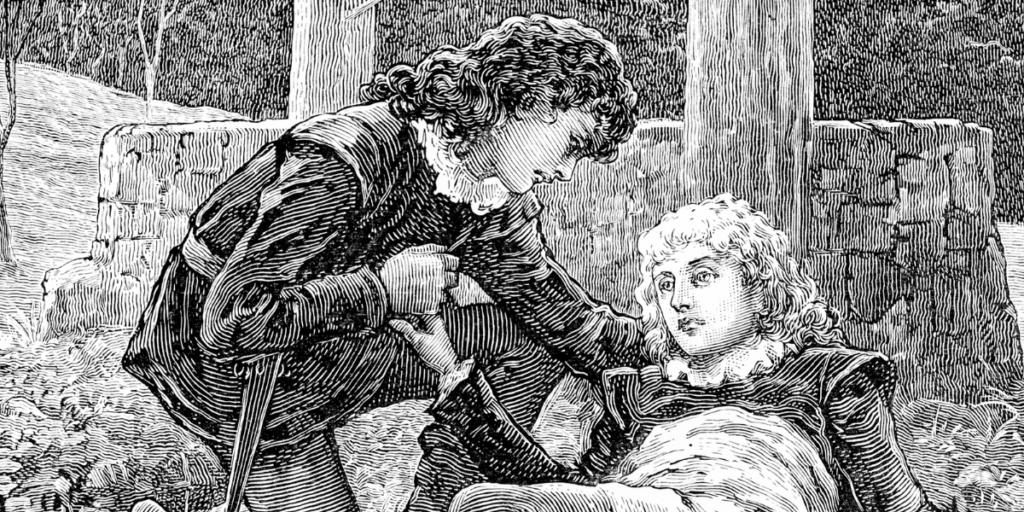In Greek mythology, King Peleus is a hero well known for his participation in the Trojan War and as the father of the legendary warrior Achilles. Peleus was the son of the king of Aegina, Aeacus. He was born into a royal family in Thessaly, a region in ancient Greece.

Peleus was destined for greatness from the moment of his birth. Peleus was a fearless and talented warrior who took part in many of the most critical occasions in Greek mythology. He is also famous for his marriage to the sea nymph Thetis, which produced the great hero Achilles, who played a crucial role in the Trojan War.
In this article, we will explore King Peleus’s life, struggle, and legacy.
Birth And Early Life
King Peleus was born into a royal family in Thessaly, a region in ancient Greece. His father was Aeacus, king of Aegina, and his mother was a mortal princess, Endeis. Peleus had one older sister, Antigone, and two younger brothers, prince Telamon and Phocus (his stepbrother).
According to the legend, Peleus was born under unusual circumstances. An oracle had told his mother that her son would one day be greater than his father, so Ares, fearing that Peleus might challenge him for his throne, tried to kill him. However, Endeis manages to save her son by hiding him in a chest and entrusting him to the care of a centaur named Chiron.
Chiron raised Peleus in the mountains, where he was thoroughly trained in battle, hunting, and music. He also learned the ways of the gods and became a skilled warrior and hunter. Peleus left Chiron’s care when he was old enough to set out independently. He eventually returned to Thessaly and claimed his rightful place as the region’s king.
As a young man, Peleus distinguished himself as a brave and skilled warrior. He participated in many great battles and adventures, including the Argonauts’ quest for the golden fleece.
Death of Peleus’ Brother

Peleus had a younger brother named Phocus, known for his extraordinary strength and athletic abilities. Phocus was the son of Aeacus and a mortal woman named Eriboea. He was favored by his father above all his other children.
Despite his many talents, Phocus was also known for his jealousy and ambition. He was jealous of Peleus’ success and coveted his throne, often quarreling with him over their father’s favor. The two brothers were constantly at odds, and their rivalry eventually led to tragedy.
One day, while they were hunting together, Phocus accused Peleus of cheating, and the two brothers began to argue. Peleus accidentally killed his brother with his spear in the heat of the moment. Horrified by what he had done, Peleus fled Thessaly and went into exile, wandering the land as a hunted man.
The death of Phocus weighed heavily on Peleus, and he lived the rest of his life haunted by the memory of what he had done. Despite his outstanding achievements and successes, Peleus always carried the guilt of his brother’s death with him.
Exiled Peleus
Peleus was exiled after accidentally killing his younger brother Phocus during a hunting trip. Overcome with grief and guilt, Peleus fled Thessaly, where he was born and raised, and went into exile. He became a hunted man, forced to live in the wilderness and survive on whatever he could find or catch.
Peleus’ exile was a time of great hardship for him. He had to constantly be on the move, never staying in one place for long. During this time, he faced numerous threats and difficulties, including attacks by wild animals and even capture and detention by some of his adversaries.
Peleus remained determined and never lost hope. He believed that one day he would be able to clear his name and return home. Peleus’ exile ended when he could finally prove his innocence and forgive himself. He could do this with the help of the god Apollo, who revealed the truth of what had happened to Phocus. Peleus then returned home and reclaimed his throne as king of Thessaly.
The experience gained during his exile was invaluable. He learned to rely on his strength and resourcefulness, and these qualities would serve him well in the years ahead. Peleus’ exile was challenging, but it also made him a stronger and wiser man.
Peleus’ Participation in The Argonaut’s Quest For The Golden Fleece
Peleus is best known for participating in the Argonauts’ quest for the Golden Fleece. The Argonauts were a team of heroes who sailed with the legendary figure Jason in search of the Golden Fleece. This mythical object was said to have magical powers.
Peleus was one of the Argonauts and played a vital role in the quest. The Argonauts’ journey was filled with many challenges and dangers. They had to navigate treacherous seas, face fierce monsters, and overcome many other obstacles. Peleus used his strength and courage to help overcome these challenges, and his skills as a warrior and hunter proved invaluable to the group.
Despite their many dangers, the Argonauts ultimately succeeded in their quest. They found the Golden Fleece and returned home with it, becoming heroes. Peleus’ participation in the Argonauts’ quest was a defining moment and cemented his reputation as a brave and skilled warrior.
Peleus’ Role in The Trojan War

Peleus was a king of the Myrmidons, a tribe of warriors in ancient Greece. He is most famously known for his role in the Trojan War as the father of Achilles, the greatest fighter in the Greek army.
According to legend, Peleus was one of the suitors of the sea nymph Thetis, who was sought after by many mortal men. It is due to a prophecy that stated that her son would be greater than his father.
Peleus won the hand of Thetis by capturing her and holding her captive, despite the objections of the gods. The marriage between Peleus and Thetis was the subject of the play “Peleus and Thetis” by the Greek tragedian Aeschylus.
Peleus’ Marriage to The Sea Nymph Thetis
One of the most famous stories about Peleus is his marriage to the sea nymph Thetis. According to the myth, Thetis was a beautiful and powerful sea nymph sought after by many suitors. However, she was resistant to marriage and sought to remain single.
Despite this, Peleus was determined to marry Thetis and win her heart. He pursued her relentlessly, and eventually, Thetis agreed to marry him. However, she made him promise that he would never try to control or dominate her, as she valued her independence.
The marriage of Peleus and Thetis was a grand event attended by many gods and goddesses. It was held on Mount Pelion, and the wedding feast was presided over by the god Eris, the goddess of discord.
During the feast, Eris threw a golden apple into the crowd, inscribed with the words “For the fairest.” This caused a dispute among the goddesses Aphrodite, Athena, and Hera, who all claimed to be the fairest. Paris eventually settled the matter, and the prince of Troy chose Aphrodite as the fairest and was awarded the apple.
Despite the tensions at the wedding, Peleus and Thetis’ marriage was happy. Thetis bore Peleus a son, Achilles, who became one of the most significant figures in Greek mythology. She also taught him the art of warfare and trained him to use weapons.
Peleus and Thetis’ marriage was eventually cut short when Thetis was summoned back to the sea by her father, the sea god Nereus. Peleus was heartbroken by her departure, but he remained faithful to her and never remarried. He lived as a respected and honored hero, remembered for his bravery, strength, and love for the sea nymph Thetis.
FAQ’s
Thetis was sought after by many mortal men due to a prophecy that stated that her son would be greater than his father. Despite the gods’ protests, Peleus managed to win Thetis’s hand by kidnapping and imprisoning her.
In addition to his son Achilles, Peleus is also said to have had a son named Telamon, who was the father of Ajax, another hero of the Trojan War. Peleus is also said to have had a son named Phocus, born to a woman named Eurymedusa.
King Peleus is remembered as a heroic figure in Greek mythology and is often depicted as a wise and just king. Peleus has appeared in literature, the visual arts, and motion pictures in contemporary culture, including Homer’s epic poem “The Iliad” and Aeschylus’ play “The Eumenides.”
Conclusion
Peleus was a significant figure in Greek mythology, known for his part in the Trojan War as the father of Achilles and his marriage to the sea nymph Thetis. He is remembered as a wise and just king. His legacy has been referenced in literature and art throughout history.
